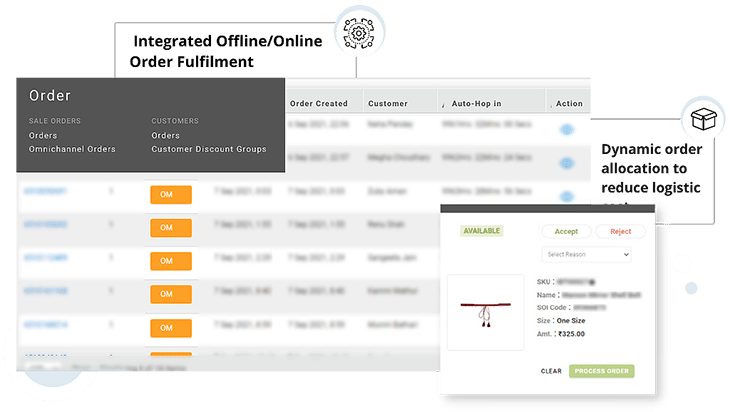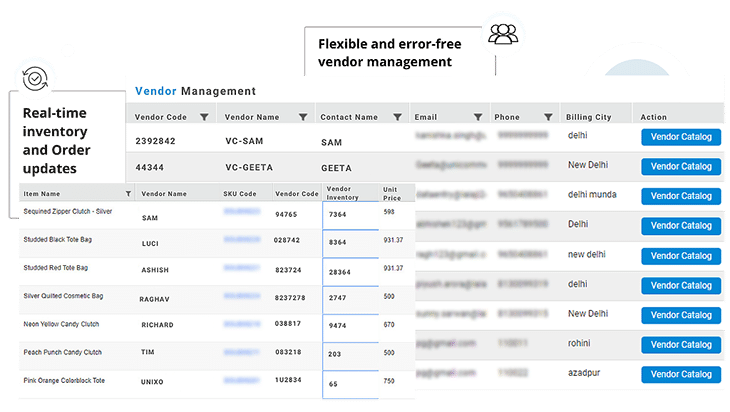Automate the supply chain of your business with a unified view of operations from a single source of data by using Unicommerce’s cost-efficient e-commerce solutions.

Serving as an Integral Part for E-commerce Businesses’ Tech Stack
Our solutions with stable integrations and partner network, makes it a perfect fit for growing businesses

How Leading Brands Scripted a Winning Story with Unicommerce
See What Our Happy Customers Have to Say About Unicommerce

Avinash Dhagat
Vice President – Operations
Honasa Consumer Pvt. Ltd.

Anand Dureja
VP, Beauty & Wellness
Urban Company

Bela Gupta D’Souza
Vice President – Operations
Founder, Edamama

Saurabh Bansal
Chief Digital Officer
TCNS
Operating System For E-commerce
An integrated e-commerce enablement SaaS platform designed to fulfill the needs of sellers, D2C brands, and retailers.
- Warehouse Management
- Order Management
- Inventory Management
- Omnichannel Retailing
- Seller Management Panel
Integrated with marketplaces and shipping providers, the warehouse management solution of Unicommerce supports better inventory balance. Managing 8000+ warehouses, the scalable solution enables item, batch, and SKU level traceability to control the quality throughout the lifecycle.
Know more about Warehouse Management System
Unicommerce provides an automated system that’s designed uniquely to work smoothly in a multichannel sales environment. From ‘where to route’ to ‘how to ship’, all your backend operations are handled systematically across multiple sales channels, including Flipkart, Myntra, Amazon, Noon, Magento, Shopify, Lazada, Amazon Flex, eBay,etc.
Know more about Multichannel Order Management
Unnecessary stockouts tend to disturb the flow of the whole supply chain. From distinguishing between good and bad inventory to minimizing the rate of returns, Unicommerce’s automated inventory management system is designed for your business needs and is being used by users.
Know more about Inventory Management

Omnichannel management allows a seamless view of inventory across online/offline stores, and enables use cases such as “Ship from Store”, “Hyperlocal fulfillment”, etc., through seamless integrations with Point of Sales/ERPs, etc. Moreover, the platform is already powering 1900+ stores!
Know more about Omnichannel Retailing
Meeting the demands of the dynamic e-commerce industry is easier than ever with the Seller Panel solution of Unicommerce. Track the delivery status and manage high product assortments while maintaining relationships with vendors to drive your sales.
Know more about Multi Seller Panel Management
D2C Focused E-commerce Platform
Our D2C focused e-commerce platform and plug-and-play integrations enable sellers to serve directly to their customers.
- Batch Management For Effective Fulfillment
- Seamless Management Of Both B2B & B2C Orders
- Partial Shipment Of Bulk Orders
- Future-Ready Returns Feature
- Systematic Dashboard & Reports
Batch Management For Effective Fulfillment
Make different batches by segregating the inventory based on its attributes (Cost, Expiry, Mfg, etc.) while implementing expiry management methods, such as FIFO & FEFO.
Seamless Management Of Both B2B & B2C Orders
Centralize both B2B & B2C orders with an emphasis to boost offline sales with the highly adaptable platform.
Partial Shipment Of Bulk Orders
Embrace the ‘splitting of orders’ feature in your system that treats individual items separately on a single order to achieve prompt order processing.
Future-Ready Returns Feature
Improve traceability of your returned order while simplifying the hurdles present in the order returns process with the next-gen returns management feature.
Systematic Dashboard & Reports
Get more visibility of the data with the advanced analytics & dashboard, and keep a tab on the order, product, and channel alerts.
Operating System For E-commerce
New-age e-commerce enablement technological solutions designed specially to fulfill the needs of sellers, D2C brands, and retailers.
Warehouse Management
Integrated with marketplaces and shipping providers, the warehouse management solution of Unicommerce supports better inventory balance. Managing 8000+ warehouses, the scalable solution enables item, batch, and SKU level traceability to control the quality throughout the lifecycle.
Know more about
Warehouse Management System

Order Management System
Unicommerce provides an automated system that’s designed uniquely to work smoothly in a multichannel sales environment. From ‘where to route’ to ‘how to ship’, all your backend operations are handled systematically across multiple sales channels, including Flipkart, Myntra, Amazon, Noon, Magento, Shopify, Lazada, Amazon Flex, eBay,etc.
Know more about
Multichannel Order Management
Inventory Management System
Unnecessary stockouts tend to disturb the flow of the whole supply chain. From distinguishing between good and bad inventory to minimizing the rate of returns, Unicommerce’s automated inventory management system is designed for your business needs.
Know more about
Inventory Management
Omnichannel Retailing
Omnichannel management allows a seamless view of inventory across online/offline stores, and enables use cases such as “Ship from Store”, “Hyperlocal fulfillment”, etc., through seamless integrations with Point of Sales/ERPs, etc. Moreover, the platform is already powering 3000+ stores!
Know more about
Omnichannel Retailing
Vendor Panel Management
Meeting the demands of the dynamic e-commerce industry is easier than ever with the Vendor Panel solution of Unicommerce. Track the delivery status and manage high product assortments while maintaining relationships with vendors to drive your sales.
Know more about
Multi Vendor Panel Management
D2C Focused E-commerce Platform
Our D2C focused e-commerce platform and plug-and-play integrations enable sellers to serve directly to their customers.
Batch Management For Effective Fulfillment
Make different batches by segregating the inventory based on its attributes (Cost, Expiry, Mfg, etc.) while implementing expiry management methods, such as FIFO & FEFO.
Seamless Management Of Both B2B & B2C Orders
Centralize both B2B & B2C orders with an emphasis to boost offline sales with the highly adaptable platform.
Partial Shipment Of Bulk Orders
Embrace the ‘splitting of orders’ feature in your system that treats individual items separately on a single order to achieve prompt order processing.
Future-Ready Returns Feature
Improve traceability of your returned order while simplifying the hurdles present in the order returns process with the next-gen returns management feature.
Systematic Dashboard & Reports
220+ Plug & Play Integrations
Experience seamless e-commerce integrations across Marketplaces, WebStores, Logistics Providers, ERP, POS, and other systems.
Marketplace Integration
Reach out to millions of customers and expand your product portfolio using power-packed marketplace integrations, including Lazada, Amazon Flex, Flipkart, Myntra, among others.
Cart Integrations
Nurture the digital attire of your business and reach out to millions of customers with the leading cart integrations, including Shopify, Magento, WooCommerce, among others.
Logistics Integrations
Route your orders quickly across the customers by integrating the most sought-after last-mile delivery platforms, such as Fleet, Ekart Logistics, DHL, DTDC, Shiprocket, among others.
ERP Integrations
Upgrade your business process capabilities to align operations smoothly while syncing ERP integrations, including Logic ERP, Tally, Wondersoft and Ginesys
POS Integrations
Build integrated offline & online capabilities to deliver quick services to your customers with simple yet scalable POS integrations, such as Ginesys, Logic ERP, among others
An Extensive Suite of Technology
The scalable solutions are curated with integrated technology, letting you streamline your business operations.
Handheld Devices For Paperless Operations
Reduce paper consumption at the operational level with an aim to promote sustainability and reduce picking errors by automating key inbound and outbound processes across locations.
Expiry Management With FIFO & FEFO
Manage the expiry dates of your products by enabling methods such as FIFO and FEFO that in time allow product visibility across multiple fulfillment centers.
Cost-efficient Inventory Cycle Counts
Automate the process of cycle count while keeping a track of your most valuable items to reduce any sort of discrepancies.
Barcode Enabled Inventory System
Have complete control over your inventory and perform operations such as picking, packing, QC, product inwarding, and more with the barcode integrated system
Customizable Billing Templates
Leverage the advanced billing templates that support all sorts of business needs, including invoices, gate pass, purchase orders, manifest, etc.
220+ Plug & Play Integrations
Experience seamless e-commerce integrations across Marketplaces, WebStores, Logistics Providers, ERP, POS, and other systems.
Marketplace Integration
Reach out to millions of customers and expand your product portfolio using power-packed marketplace integrations, including Lazada, Amazon Flex, Flipkart, Myntra, among others.
Cart Integrations
Nurture the digital attire of your business and reach out to millions of customers with the leading cart integrations, including Shopify, Magento, WooCommerce, among others.
Logistics Integrations
Route your orders quickly across the customers by integrating the most sought-after last-mile delivery platforms, such as Fleet, Ekart Logistics, DHL, DTDC, Shiprocket, among others.
ERP Integrations
Upgrade your business process capabilities to align operations smoothly while syncing ERP integrations, including SAP, Oracle, Microsoft Navision, among others.
POS Integrations
Build integrated offline & online capabilities to deliver quick services to your customers with simple yet scalable POS integrations, such as Ginesys, Logic ERP, among others
An Extensive Suite of Technology
The scalable solutions are curated with integrated technology, letting you streamline your business operations.
- Handheld Devices For Paperless Operations
- Expiry Management With FIFO & FEFO
- Cost-efficient Inventory Cycle Counts
- Barcode Enabled Inventory System
- Customizable Billing Templates
Handheld Devices For Paperless Operations
Reduce paper consumption at the operational level with an aim to promote sustainability and reduce picking errors by automating key inbound and outbound processes across locations.
Expiry Management With FIFO & FEFO
Manage the expiry dates of your products by enabling methods such as FIFO and FEFO that in time allow product visibility across multiple fulfillment centers.
Cost-efficient Inventory Cycle Counts
Automate the process of cycle count while keeping a track of your most valuable items to reduce any sort of discrepancies.
Barcode Enabled Inventory System
Have complete control over your inventory and perform operations such as picking, packing, QC, product inwarding, and more with the barcode integrated system
Customizable Billing Templates
Leverage the advanced billing templates that support all sorts of business needs, including invoices, gate pass, purchase orders, manifest, etc.
Industry Experts Call Us a Differentiator


































